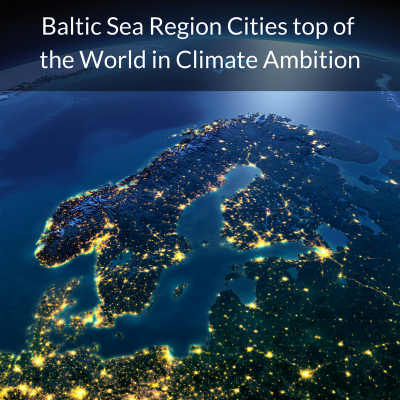New report on UBC cities’ environmental data disclosure to CDP highlights adaptation actions to extreme weather events.
The newest report on climate change mitigation and adaptation actions that UBC cities are actively engaging in has been published. This UBC-CDP cooperation report from 2019 focuses on extreme weather events and the adaptation actions that UBC cities are taking to cope with the impacts.
The disclosure period took place from 15 April to 31 July 2019 and altogether 26 UBC cities disclosed their city’s climate change-related data to CDP as well as examples of actions that are being taken for climate mitigation and adaptation.
These UBC cities were: Pärnu and Tartu from Estonia, Espoo, Helsinki, Kemi, Lahti and Turku from Finland, Greifswald and Rostock from Germany, Riga from Latvia, Panevezys, Taurage, Klaipeda and Siauliai from Lithuania, Arendal and Kristiansand from Norway, Gdansk and Gdynia from Poland and Malmö, Trelleborg, Visby, Växjö, Karlskrona, Västervik, Umeå and Örebro from Sweden.
Reporting on actions on the local level
In the new UBC-CDP cooperation report we have taken into account the feedback from our UBC member cities and we have included more good examples and comments from the local level and less global/regional comparison.
The report highlights nature-based solutions as well as adaptation planning activities from the cities. These so-called “blue-green solutions” are gaining momentum and are becoming more and more important in the face of the changing climate. Hopefully, these concrete examples inspire others and help make UBC cities more resilient to different kinds of climate hazards.
The focus areas of the report are the extreme weather events that can have costly impacts on our cities’ infrastructure – such as properties, transport, health and well-being, to name a few. In the Baltic Sea Region, we have seen for example heavy rainfall causing roads and metro lines to be shut down due flooding, contamination incidents due to mixing of wastewater and stormwater and record high temperatures.
Some of the key climate hazards that manifest in extreme weather events were identified by the UBC cities as follows:
- Extreme precipitation
- Flood and sea level rise
- Extreme hot temperature
- Storm and wind
- Water scarcity
Read more about the findings and the concrete actions. Download your copy of the report here: https://www.ubc-sustainable.net/library/publication/ubc-cities-adaptation-actions-extreme-weather-events
About UBC – CDP cooperation
In the XIV UBC General Conference on 24–27 October 2017 in Växjö, Sweden, a joint report by UBC and CDP on Climate Leadership from Baltic Sea Region Cities was launched.
CDP, formerly Carbon Disclosure Project, is an international, not-for-profit organisation providing a global system for companies, cities, states and regions to measure, disclose, manage and share vital information on their environmental performance. Over the past 15 years CDP has created a system that has resulted in unparalleled engagement on environmental issues worldwide. CDP now holds the most comprehensive collection globally of primary environmental data and puts these insights at the heart of strategic business, investment and policy decisions. Follow @CDP on Twitter and www.cdp.net/en to find out more.
UBC-CDP cooperation report 2017


